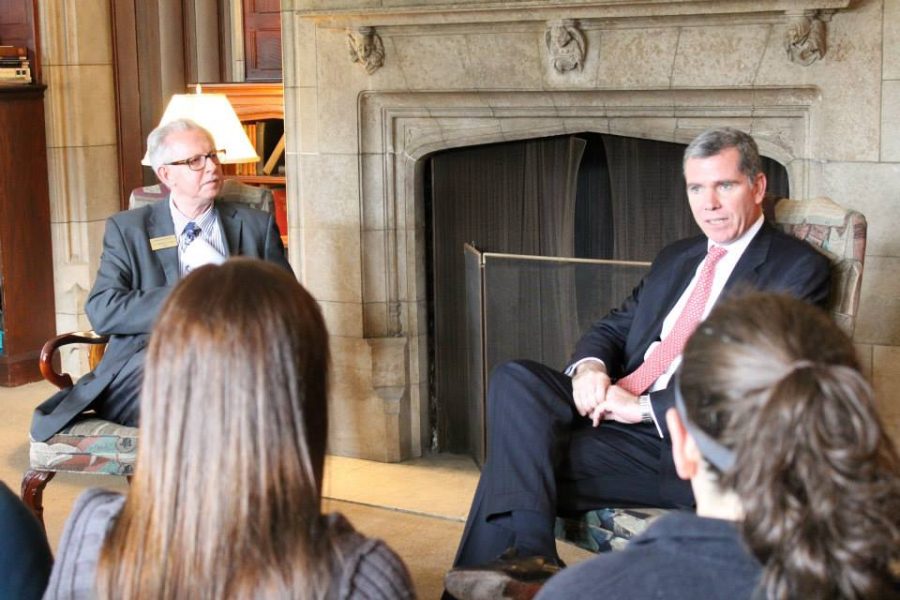His Excellency Felipe Bulnes, ambassador of Chile to the United States was invited to Chatham University on November 4 to receive a Doctor Honoris Causa for Public Service. Before the ceremony and in the context of the University’s Global Focus Program’s Year of the Andes, the Ambassador held an open discussion session in the Mellon living room with Chatham students and faculty members.
The audience raised questions pertaining to education, the role of civil society, climate change and rising protests from the Mapuche minority. In the area of education, the Ambassador gave a brief description of how the education system functions in Chile, emphasizing that standards are high for students entering the University. The scores they obtain on entrance exams determine the amount of scholarships they receive; however he believes that the educational system can still be improved.
Establishing higher quality standards for teachers through standardized testing administered on a continuous basis to assess performance will serve as a basis for post retention. It will also be supported by putting safeguards in place to prevent unfair dismissal.
Regarding civil society in Chile, the Ambassador informed the audience that civil society had practically no space in society until the return of democracy in the 1990s. Recently however, with the building of its influence, it has become more and more confrontational. On climate change, Chile’s geography makes it vulnerable to climate change. The Ambassador indicated that his country is taking actions to reduce green house gas emissions by 20% by 2020. By 2025, 20% of energy consumed will come from renewable energy sources.
On the subject of the Mapuche minority in Chilean society, the Ambassador said the issue is being dealt with through an agency in charge of native issues which operates with the Ministry of Social Development. The meeting concluded with a note on Chilean culture and its extraordinary literary achievement especially considering the size of its population.
At 4 p.m. President Esther Barazzone welcomed Ambassador Bulnes in the Mellon Board Room for the degree granting ceremony. She also introduced Chile’s main features to a university wide audience. She emphasized the remarkable climate diversity of the country, its technological advances by referring to the miners rescue operation in October 2010 and she mentioned that Chile elected its first woman president in 2006.
The President’s introduction was followed by a brief presentation from Dr. Jean Jacques Sene, director of the Global Focus program. Dr. Sene strongly encouraged the audience to immerse itself in global understanding. “Global focus events have the ambition of creating a space where anyone can enhance their critical thinking with a healthy dose of global competencies hidden in the script,” he said.
The Chairman of the Advisory Board, former United States Ambassador Dan Simpson, then took the podium and introduced Ambassador Bulnes, a Harvard Law school graduate and a Fulbright scholar. As an eminent lawyer, Ambassador Bulnes will be representing his country at the International Court of Justice in a maritime dispute with Bolivia. Simpson also said Bulnes spent most of his career as an educator, and his presence on Chatham campus is most relevant.
Ambassador Bulnes was then invited to the podium to receive his awards. In his acceptance speech, he remarked that he was proud to receive this honor on behalf of his country which has seen enormous change in 24 years where human rights and democracyare at the core of this transformation.
The Ambassador also pointed out that education, which promotes human capital is the best tool for achieving development and creates equal opportunities. He believes that the main efforts should be to capture what America has in abundance: ideas, technology, and innovation.
He concluded by saying that Chile has the capacity to remove inequality and move from concept to crystal clear reality.
Chatham grants Chilean ambassador honary degree
November 25, 2013
0


